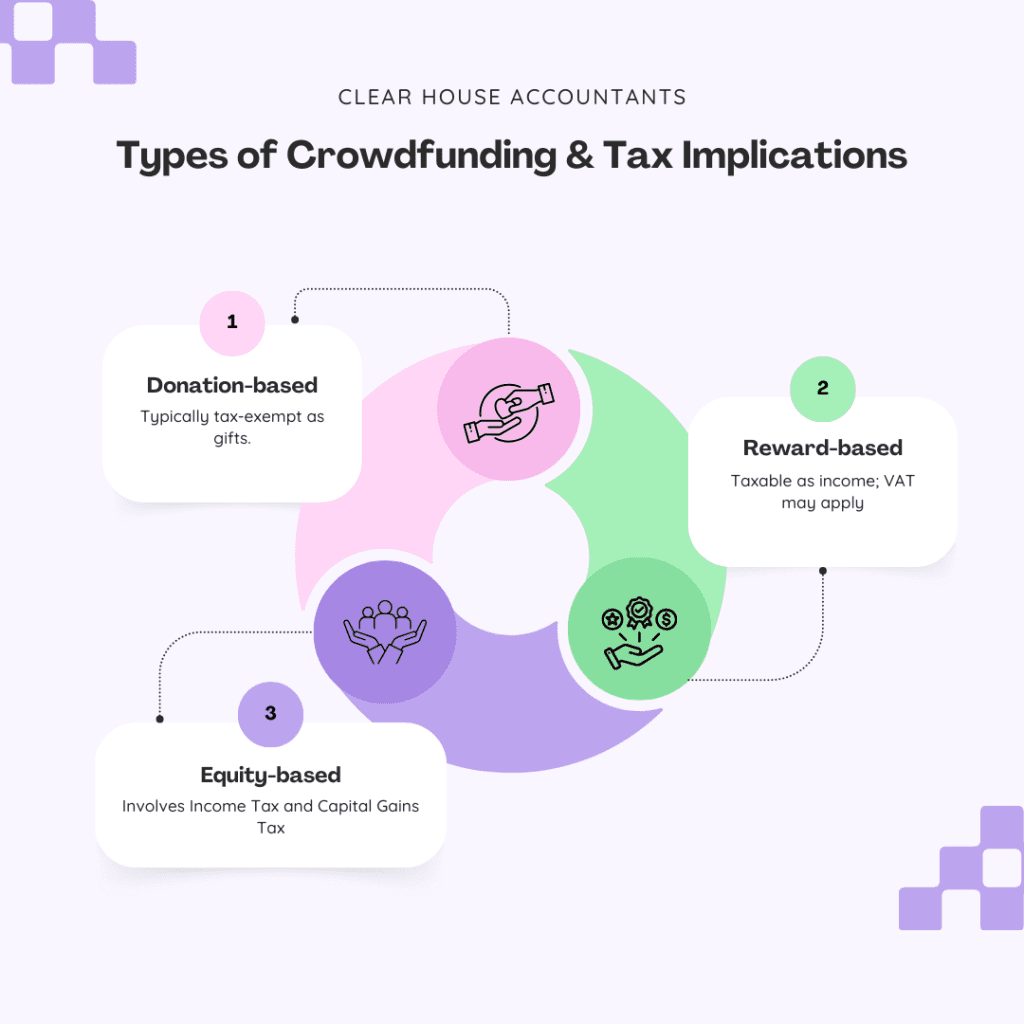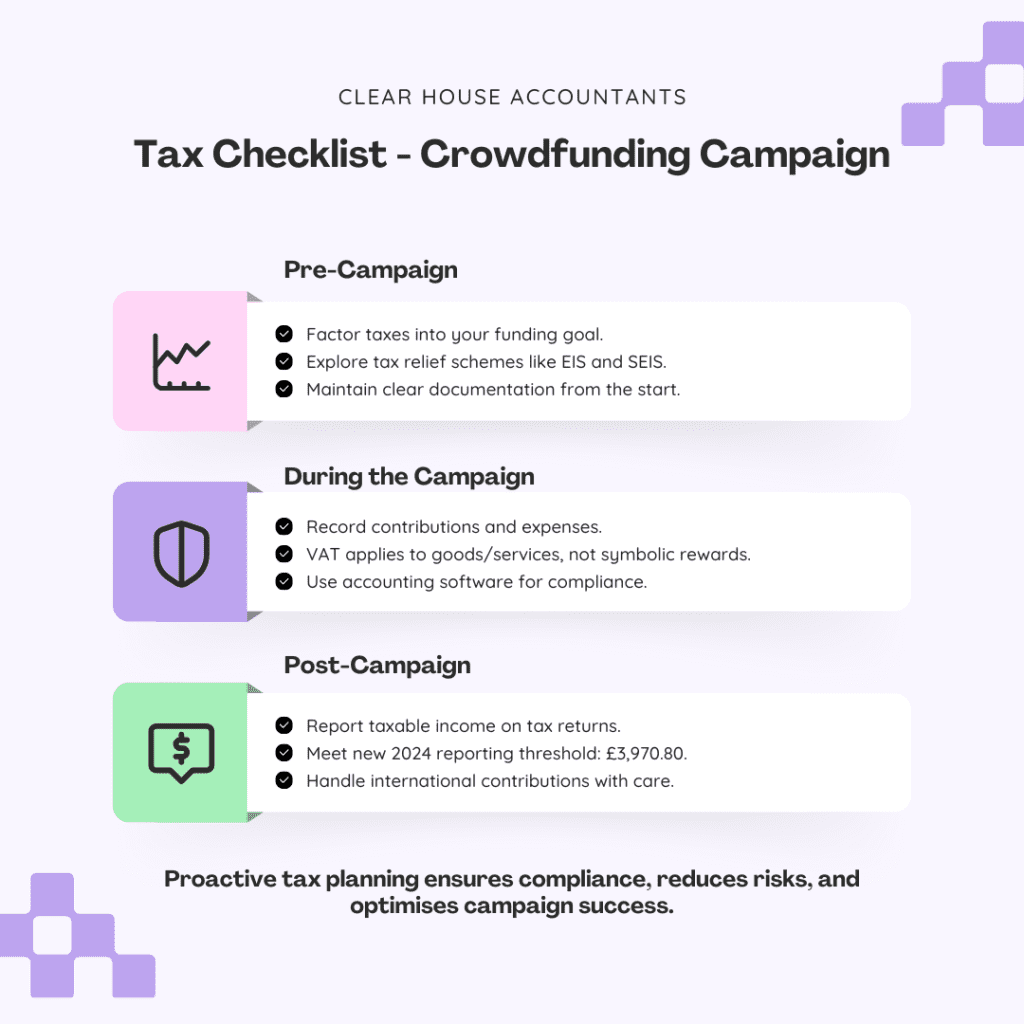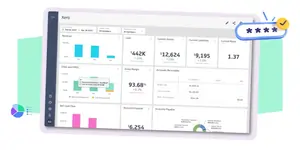Most campaign creators concentrate on their pitch and marketing plan but generally forget the very important aspects, which, when not taken care of, can become a hindrance to their successful campaign and that are taxes and crowdfunding obligations.
We have seen many UK crowdfunding campaign creators grappling with questions such as “Is crowdfunding taxable?” “Does crowdfunding count as income?” “Are donations taxable?” and “How does crowdfunding work UK tax-wise?” Whether you’re planning a business venture or considering crowdfunding for personal use, understanding your tax responsibilities is essential. That’s why we’ve created this done-for-you detailed guide to help you navigate the tax implications of your crowdfunding journey.
In this article, we are going to guide you on how to manage taxes before, during, and after your campaign. With basic considerations and strategies to plan your taxes effectively, you should feel more than prepared to manage that side of your campaign.
Explore more in-depth guides if you’re starting a new business in the UK
Understanding Tax Obligations Before Launch
The following are important tax points to consider before you launch your crowdfunding campaign. Consider this a guide that will help you steer clear of the issues we’ve seen pop up time and again.
Tax Considerations Key in Campaign Planning
Before you start your campaign, we’d like to inform you that different types of crowdfunding come with different tax implications. While donation-based crowdfunding generally treats donations as gifts and is therefore often exempt, reward-based and equity-based crowdfunding are typically treated as income and are therefore liable to income tax.
Here are the key points you need to consider:
- Income Tax obligations on funds raised
- VAT implications for rewards offered
- Record-keeping requirements
- Potential international tax obligations
- Tax implications of different reward structures
The way you structure your rewards significantly impacts your tax obligations. When offering rewards in exchange for contributions, you’ll need to account for their value as income and pay income tax accordingly. If, within your campaign, there is an element of giving goods or services that have intrinsic value — such as clothing or DVDs — those too will be subject to VAT considerations.
We recommend calculating your funding goal with taxes explicitly factored in. Keep in mind that if your campaign does raise over £15,883.20 and does involve more than 200 backers, then you will need to prepare for more tax reporting requirements.
For UK businesses, we highly recommend looking into the Enterprise Investment Scheme (EIS) and Seed Enterprise Investment Scheme (SEIS) because, through these government programs, you can achieve important tax benefits for your campaign. These programs will make your campaign more attractive to potential backers and, at the same time, be tax-efficient for your project.
Find Out more about EIS and SEIS scheme and compare them for your particular business

Tax Planning Throughout the Campaign
Taxes can seem like a lot to handle during your campaign activity, but the right approach actually makes it less complicated. Here are the core areas you need to handle.
Documentation of Contributions
By law, you are supposed to keep comprehensive and accurate records of all crowdfunding activities for at least three years. Here’s what we recommend keeping:
- Detailed records of all contributions and their sources
- Invoices and receipts for all campaign-related expenses
- Documentation of reward delivery and related costs
- Proper income reporting for tax returns
Treatment Of VAT on Active Campaigns
Regarding VAT, you need to look carefully at what you’re offering in return for the contributions. If you provide goods or services with intrinsic value (such as merchandise or products), these are considered taxable supplies and may be subject to VAT. However, this won’t trigger VAT obligations if your rewards are purely symbolic (e.g., mentioned in a program).
Tax Treatment of Ongoing Rewards Fulfillment
Your tax liabilities are normally pegged upon the point at which you deliver the rewards and not at the point at which you receive the funds. For businesses that are VAT-registered, in the case that crowdfunded money presents an advance payment for goods or services, then it counts as part of your VAT-taxable income.
Donation Versus Reward-Based Contributions
Many of our creators get confused between donations and reward-based contributions. Although donation-based crowdfunding (without rewards) is typically treated as contributions or gifts and is generally not taxable, in most jurisdictions, when it comes to reward-based crowdfunding, it becomes chargeable to income tax as income.
Remember, if your campaign offers rewards of value, the money raised is considered to be a prepayment. This means for businesses that are VAT registered, these funds will be a part of your VAT calculation. We strongly recommend using accounting software to track these transactions so that you can ensure your compliance with all your tax obligations.
Explore more on Top Accounting Software and read our Review Guides to decide which accounting software is for you.
Post-Campaign Tax Compliance
Now that your campaign is over, we will help you understand and meet your tax obligations. There are important things that are part of your responsibility at this post-campaign stage.
Things that you need to know:
Taxable Income from Campaigns
Your tax liability will largely depend on the type of campaign that you engaged in. In reward-based campaigns, the funds raised typically present themselves as income and will find a slot on your tax return since, on personal campaigns (medical expenses, disaster relief) contributions are viewed as gifts and, therefore, are not taxable.
Creators confuse the thresholds. With effect from 2024, the new rule states that crowdfunding platforms will have to report payments to campaign organisers where the gross amount exceeds £3,970.80.
Filing requirements and deadlines
The basic rules of reporting are as follows:
- All revenue in the financial statements pertains to crowdfunding rewards
- Add VAT if applicable
- Maintain a record of all campaign-related spending to claim deductions
- Have all transactions and communications related to campaigns filed in appropriate files
International Tax Obligations
When dealing with international backers, tax matters become more complex. We need to consider foreign tax implications and withholding requirements. For UK businesses receiving international funding, you’ll need to account for:
- Different tax treatments in different jurisdictions
- Various VAT obligations in different regions
- International payment processor charges
- Implications of currency conversion
Remember that if you’re working across borders, you may face different tax regimes. The European Union, for instance, has different tax treatments for crowdfunding services in its member states. We recommend working with a tax professional who understands international tax laws to ensure full compliance.

Tax Planning Strategies for Campaigns
Smart tax planning can make a huge difference in your success with crowdfunding. We have worked with many campaign creators to optimise their tax positions, using proven strategies that we are excited to share now.
Timing considerations for tax efficiency
We’ve found that timing your campaign launch and fund collection can significantly impact your tax position. Consider ending your campaign early in the tax year, as this gives you more time to incur deductible expenses in the same tax period. For VAT-registered businesses, bear in mind that crossing the £90,000 threshold in a rolling 12-month period will trigger VAT registration.
Allowable Deductions and Expenses
Let’s identify what you can claim. Here are some of the most common allowable expenses for crowdfunding campaigns:
- Platform fees and marketing
- Campaign-related business expenses
- Reward fulfilment
- Professional service fees
Remember that you can only claim back reasonable, documented expenses that relate directly to your business. There are also some specific allowances applicable to equity-based campaigns under EIS and SEIS applications.
Dealing with Tax Professionals
We strongly recommend working with tax professionals who understand crowdfunding. Here’s why: the crowdfunding tax implications will be differing based on the type of campaign that you run. While donation-based campaigns could be tax-free, especially for personal grounds, reward-based campaigns will be treated as taxable business income.
A qualified tax professional can help you:
- Structure your campaign for maximum tax-efficient returns
- Meet responsibilities for international tax
- Take advantage of available tax reliefs
- Ensure everything is done in accordance with HMRC requirements
Equity crowdfunding: professional advice will be needed as you will have to consider Capital Gains Tax implications on both you and your investors. Additionally, although the professional fees appear large, they usually offset themselves through the savings made in taxes and the assurance of compliance.
Additional Resources
Conclusion
Navigating tax obligations in crowdfunding campaigns might appear difficult, but it’s not so when understood and planned. This guide thus walks you through how the different types of crowdfunding influence your tax position and the actions you must take before, during, and after your campaign.
Remember that where donation-based crowdfunding typically qualifies as an exempt gift for tax purposes, reward-based campaigns usually equate to taxable income. Detailed records, knowledge of VAT implications, and proactive planning on international tax obligations will help you stay compliant and avoid any unwelcome surprises.
Smart tax planning is critical to the success of the campaign. We encourage you to start your tax preparation early and maintain detailed records throughout your campaign. Most of the successful creators prefer working with qualified tax professionals to optimise their tax position and ensure full compliance with HMRC requirements.
More importantly, see your tax obligations as part and parcel of your campaign strategy, not as an afterthought. Such an approach will assist you in setting reasonable funding goals, keeping proper documentation, and getting all available tax benefits to make your crowdfunding succeed.









































































